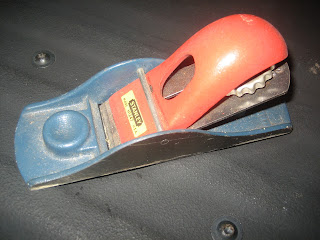 |
| Classic Stanley Handyman Plane |
So why would today's craftsman even bother using hand tools when power tools make it faster and easier to product good quality product? There are five main reasons I choose to use a number of old hand tools:
Price - If I had an empty garage and a $200 tool budget, almost every piece of equipment I would buy would be a hand tool (the only exception would be an electric drill.) You get more for your money with hand tools, and could outfit your entire shop on a minimal budget.
Durability - This may not be the case with the hand tools made today, but the durability of an average hand tool over 30 years old is usually very good. In an age when premium brand power tools may only come with a one year warranty, the lifetime of a classic hand tool, with care, can last generations.
Intimacy with the Craft - Some woodworkers, such as Roy Underhill, see the use of power tools as a step away from the traditional craft, making wood working more business and less art. While a power tool may help you produce volume, properly tuned hand tools can help you produce quality and detail.
 |
| Yankee Push Drills are so great, they deserve their own blog post |
Experience - Why do we still make our children memorize multiplication tables when you can buy a calculator for less than $5? Doing something by hand the long way can train your brain to develop its own shortcuts and recognize patterns or mistakes. The same can be true for woodworking, where your experience from using hand tools can make you even more competent using power tools. In fact, most professional furniture trade schools first cover mastery of hand planes, chisels, and turning before you plug in your first power tool.
 |
| My grandfather sharpened his own hand saw, an art long lost. |
I was recently blessed with the opportunity to go through my grandfather's tools and select the pieces I would take home and use in my own shop. I feel very honored to be able to use the same tools which have shaped so many pieces of furniture and metalwork from my family's generations.
To carry on these traditions is truly a very humbling experience. All of the photos listed in this blog post are not only classic hand tools, to me they are also family heirlooms.
